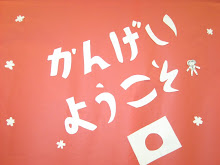Wednesday, May 6, 2009, A Block Two Day
INDEPENDENT STUDY JAPANESE
This class does not meet on Block One days.
Yesterday only student present, Rachel Schachtman, used the handout of Doraemon comic to work during this class.She wrote the content of the English dialogue balloons in Japanese。
Also viewed on Internet, Algorithm March and shared information about Japanese music sites related to Shugo Chara, Buono!, Rottara Rottara, Gachinko de Ikou, etc.
Algorithm March
(Lyrics)
いっぽ すすんで まえならえ {一歩進んで前ならへ}
いっぽ すすんで えらい 人{ひと}{一歩進んで偉い人}
ひっくり かえて ぺこりんこ {ひっくり帰ってぺこりんこ}
よこ に あるいて きょろきょろ {横に歩いてきょろきょろ}
ちょっと ここらで ひろおよぎ {ちょっと ここらで 広泳ぎ}
ちょっと しゃがんで くりひろい {ちょっと しゃがんで栗拾い}
くうき いれます シューシュー {空気入れますシューシュー}
くうき が はいって ピューピュー {空気が入って ピューピュー}
Repeat, and then end with
そとそと おわる かな {そとそと終わるかな}
そとそと おわる かな
そとそと おわる かな
おわり{終わり}
From Yahoo videos
JAPANESE 1
Handout of Hello Kitty katakana chart. Cultural discussion of Hello Kitty (one billion dollar a year business, world-wide, for example).
Listen and repeat manga dialogue for Lesson 8.
Special word on the board:
ふじさん It means Mt. Fuji, and in kanji it is written 富士山
When the kanji 山 s by itself, we use the "kun-yomi" the “Japanese style” reading and we say YAMA.
But when the kanji 山 is in a compound, we use the "on-yomi," the Chinese-style” reading and we say SAN.
Write the katakana words from the chart on a separate piece of paper and then write what the words probably mean in English
Homework: finish katakana chart words
In class, make Mother’s Day Cards
はは の ひ、 おめでとう
おかあさん、ありがとう {Or おばさん、おばあさん}
母の日、おめでとう
お母さん、有難う {Or 叔母さん、伯母さん、お祖母さん}
.
JAPANESE 3
Reminder of Pattern sentences:
Field {の中}で Subject は 一番 Adjective (+ noun) です。
Homework:
Collected Superlative-questions for a Game Show/Quiz Program in class tomorrow。Content of questions enabled fellow students to guess the answer.
List of answers: Sean Penn, Kate Winslett, Jimmy Choo, Mozart, Michael Phelps, Beethoven, President Obama, Venus Williams, Yo Yo Ma, Margot Fonteyn, Louis Armstrong, Johnny Cochran, Michael Jordan
Each student read one of his or her Superlative-questions/answers.
Example question:
世界 で 一番 すばらしい 車 は どれ です か。
(ベンズ{Mercedes Benz} です)
We listened to the Kyoto story in 3k9, and repeated it line by line
Homework is pages 117 and 119 in the workbook.
JAPANESE 2
In class, worked on verb conjugation form. Each student had to fill it out with one Group 1 verb, one Group 2 verb, します、& できます。
Verb Conjugation Practice Sheets
English meaning: ___________________ Kanji: _______________________
Number of conjugational group: ________ te form _____________
Neutral polite
affirmative ________________________ does negative __________________________ doesn’t
(non-past/habitual)
past
affirmative ________________________ did negative _________________________ didn’t
volitional: ________________________ let’s potential _________________________ can do
continuative forms:
affirmative _____________________ is doing negative _________________________ isn’t doing
past
affirmative ______________________was doing negative _________________________ wasn’t doing
potential
present
affirmative ________________________can do negative ________________________unable to do
で As relational group indicating tools, languages, and writing systems (as well as means-of-transport with traveling verbs)
Work on formation of potential verb form for Groups 1, 2, and 3.
Review grammar explanation in text Page 115.
Checked homework in workbook page 80 (A) and page 81 (B only)
New homework: ワークブック の 八十六 ページ から 八十八 ページ まで
Sang the Algorithm March
(Lyrics)
いっぽ すすんで まえならえ {一歩進んで前ならへ}
いっぽ すすんで えらい 人{ひと}{一歩進んで偉い人}
ひっくり かえて ぺこりんこ {ひっくり帰ってぺこりんこ}
よこ に あるいて きょろきょろ {横に歩いてきょろきょろ}
ちょっと ここらで ひろおよぎ {ちょっと ここらで 広泳ぎ}
ちょっと しゃがんで くりひろい {ちょっと しゃがんで栗拾い}
くうき いれます シューシュー {空気入れますシューシュー}
くうき が はいって ピューピュー {空気が入って ピューピュー}
Repeat, and then end with
そとそと おわる かな {そとそと終わるかな}
そとそと おわる かな
そとそと おわる かな
おわり{終わり}
From Yahoo videos:
Video.yahoo.com
Then search for Algorithm March and it comes up
JAPANESE 4 and AP
Worked extensively on listening comprehension today: public announcement, radio news broadcast, cultural presentation, voice message, pre-recorded message, instructions, conversation, school debate, etc.
Handout regarding Mother’s Day:
Homework -- write letter to host mother, or other
Reminder to all about oral answers to questions on page 73 of 日本との出会い。
Japanese 4 students vocabulary for upcoming test on NTND chapter 7:
商店{しょうてん}、道{みち}、モール、果物屋{くだものや}、
肉屋{にくや}、魚屋{さかなや}、八百屋{やおや}、本屋、奥{おく}、
住む{すむ}、近所{きんじょ}、お客さん{おきゃくさん}、
気持ち{きもち}、スーパー、そのうち、ご夫妻{ごふさい}、きびしい、
位{くらい}、出かける{でかける}、たとえ、以上{いじょう}、
感じる{かんじる
About Me

- O.Kimeru
- M.A. 1992 from U. of Chicago; Japan Foundation Fellow in 1987-88; research fellow Yokohama City University; Japanese language teacher since 1991; also taught French (member American Association of Teachers of French), English as a Second Language (to students), methodology of teaching ESL (to Japanese high school teachers), English, Japanese history/culture, drama; in 2002 and 2004, listed in Who's Who Among America's Teachers; member of Chicago Sister Cities Osaka Committee, and chair of its Education Sub-Committee; vice-president Illinois Association of Teachers of Japanese; Payton H.S. World Language Department Chair from 2003-2007, under founding principal Mrs. Gail Ward; taught Japanese and coordinated Japan Exchange at Payton from 2003 to 2010; Japanese teacher at Burr Public School beginning August, 2010
Followers
Blog Archive
-
▼
2009
(146)
-
▼
May
(20)
- May 29, 2009 Friday An Eight Period Day
- May 28, 2009 Thursday A Block Two Day
- May 27, 2009 Wednesday A Block One Day
- Japanese 4 June Grammar Review (work in progress)
- May 26, 2009 Tuesday An Eight Period Day
- May 22, 2009 Friday An Eight Period Day
- May 20, 2009 Wednesday A Block Two Day
- May 19, 2009 Tuesday A Block One day
- Japanese 3 June review (work-in-progress)
- May 18, 2009 Monday An Eight Period Day
- May 15, 2009 Friday An Eight Perio...
- Second Year Japanese year end review -- partial
- First Year Japanese Year End Review -- preliminary
- May 13, 2009 Wednesday A Block T...
- May 12, 2009 Tuesday A Block One...
- May 11, 2009 Monday An Eight Period Day
- May 8, 2009 Friday An Eight Period Day
- May 6, 2009 Wednesday A Block Two Day
- May 5, 2009 Tuesday A Block One Day
- May 4, 2009 Monday An Eight Period Day
-
▼
May
(20)